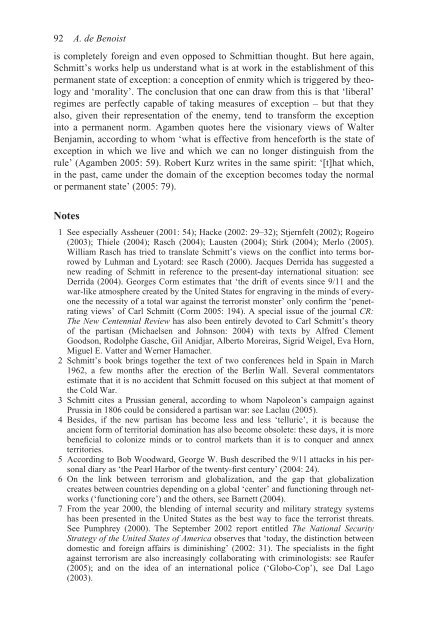The International Political Thought of Carl Schmitt: Terror, Liberal ...
The International Political Thought of Carl Schmitt: Terror, Liberal ...
The International Political Thought of Carl Schmitt: Terror, Liberal ...
Create successful ePaper yourself
Turn your PDF publications into a flip-book with our unique Google optimized e-Paper software.
92 A. de Benoist<br />
is completely foreign and even opposed to <strong>Schmitt</strong>ian thought. But here again,<br />
<strong>Schmitt</strong>’s works help us understand what is at work in the establishment <strong>of</strong> this<br />
permanent state <strong>of</strong> exception: a conception <strong>of</strong> enmity which is triggered by theology<br />
and ‘morality’. <strong>The</strong> conclusion that one can draw from this is that ‘liberal’<br />
regimes are perfectly capable <strong>of</strong> taking measures <strong>of</strong> exception – but that they<br />
also, given their representation <strong>of</strong> the enemy, tend to transform the exception<br />
into a permanent norm. Agamben quotes here the visionary views <strong>of</strong> Walter<br />
Benjamin, according to whom ‘what is effective from henceforth is the state <strong>of</strong><br />
exception in which we live and which we can no longer distinguish from the<br />
rule’ (Agamben 2005: 59). Robert Kurz writes in the same spirit: ‘[t]hat which,<br />
in the past, came under the domain <strong>of</strong> the exception becomes today the normal<br />
or permanent state’ (2005: 79).<br />
Notes<br />
1 See especially Assheuer (2001: 54); Hacke (2002: 29–32); Stjernfelt (2002); Rogeiro<br />
(2003); Thiele (2004); Rasch (2004); Lausten (2004); Stirk (2004); Merlo (2005).<br />
William Rasch has tried to translate <strong>Schmitt</strong>’s views on the conflict into terms borrowed<br />
by Luhman and Lyotard: see Rasch (2000). Jacques Derrida has suggested a<br />
new reading <strong>of</strong> <strong>Schmitt</strong> in reference to the present-day international situation: see<br />
Derrida (2004). Georges Corm estimates that ‘the drift <strong>of</strong> events since 9/11 and the<br />
war-like atmosphere created by the United States for engraving in the minds <strong>of</strong> everyone<br />
the necessity <strong>of</strong> a total war against the terrorist monster’ only confirm the ‘penetrating<br />
views’ <strong>of</strong> <strong>Carl</strong> <strong>Schmitt</strong> (Corm 2005: 194). A special issue <strong>of</strong> the journal CR:<br />
<strong>The</strong> New Centennial Review has also been entirely devoted to <strong>Carl</strong> <strong>Schmitt</strong>’s theory<br />
<strong>of</strong> the partisan (Michaelsen and Johnson: 2004) with texts by Alfred Clement<br />
Goodson, Rodolphe Gasche, Gil Anidjar, Alberto Moreiras, Sigrid Weigel, Eva Horn,<br />
Miguel E. Vatter and Werner Hamacher.<br />
2 <strong>Schmitt</strong>’s book brings together the text <strong>of</strong> two conferences held in Spain in March<br />
1962, a few months after the erection <strong>of</strong> the Berlin Wall. Several commentators<br />
estimate that it is no accident that <strong>Schmitt</strong> focused on this subject at that moment <strong>of</strong><br />
the Cold War.<br />
3 <strong>Schmitt</strong> cites a Prussian general, according to whom Napoleon’s campaign against<br />
Prussia in 1806 could be considered a partisan war: see Laclau (2005).<br />
4 Besides, if the new partisan has become less and less ‘telluric’, it is because the<br />
ancient form <strong>of</strong> territorial domination has also become obsolete: these days, it is more<br />
beneficial to colonize minds or to control markets than it is to conquer and annex<br />
territories.<br />
5 According to Bob Woodward, George W. Bush described the 9/11 attacks in his personal<br />
diary as ‘the Pearl Harbor <strong>of</strong> the twenty-first century’ (2004: 24).<br />
6 On the link between terrorism and globalization, and the gap that globalization<br />
creates between countries depending on a global ‘center’ and functioning through networks<br />
(‘functioning core’) and the others, see Barnett (2004).<br />
7 From the year 2000, the blending <strong>of</strong> internal security and military strategy systems<br />
has been presented in the United States as the best way to face the terrorist threats.<br />
See Pumphrey (2000). <strong>The</strong> September 2002 report entitled <strong>The</strong> National Security<br />
Strategy <strong>of</strong> the United States <strong>of</strong> America observes that ‘today, the distinction between<br />
domestic and foreign affairs is diminishing’ (2002: 31). <strong>The</strong> specialists in the fight<br />
against terrorism are also increasingly collaborating with criminologists: see Raufer<br />
(2005); and on the idea <strong>of</strong> an international police (‘Globo-Cop’), see Dal Lago<br />
(2003).
















